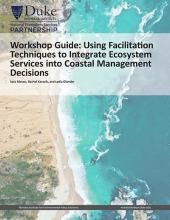
Ecosystem services such as water purification, coastal protection, and food production are increasingly important considerations for coastal managers as they design management interventions to protect coastal habitat. A collaborative project led by the Rookery Bay and North Carolina National Estuarine Research Reserves and Duke University's National Ecosystem Services Partnership created resources to help coastal managers streamline the integration of ecosystem services into their programs. These include guidance to develop Ecosystem Services Conceptual Models for estuarine habitat types, generalized Ecosystem Services Conceptual Models for oyster and mangrove habitat, tools to identify socio-economic metrics to monitor, assess and value coastal ecosystems, middle school lessons, public outreach materials, case studies in North Carolina, Florida and Hawaii, and an online ecosystem services toolkit for coastal managers.
About this resource
This workshop facilitation guide is designed to help coastal resource managers and practitioners incorporate ecosystem services into their coastal decision-making process. The guide includes a series of workshop sessions that coastal managers can use to develop Ecosystem Services Conceptual Models as an entry point for multistakeholder discussions about ecosystem services and their associated metrics and beneficiaries. Workshop sessions include:
- Making an Ecosystem Services Conceptual Model from Scratch
- Specifying an Existing Model to a Site
- Identifying and Prioritizing Metrics
- Honing and Improving Metrics
- Beneficiary Assessment
- Next Steps
Mason, S., R. Karasik, and L. Olander. 2020. Workshop Guide: Using Facilitation Techniques to Integrate Ecosystem Services into Coastal Management Decisions. Durham, NC: Duke University.